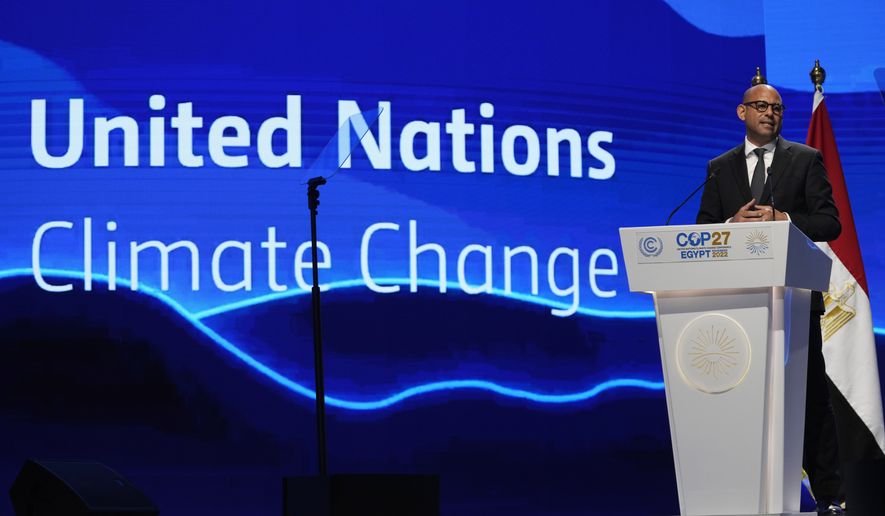OPINION:
The U.N. annual climate conference (COP27) that just concluded in Egypt might have set the record for the greatest number of bad ideas ever presented at a major international conference.
The expressed reason for these conferences is to solve the global-warming “problem” — while the practical political solution will remain forever elusive as long as the conferences are held in interesting locations where many of the participants can fly in on their private jets.
The recommendations coming out of this conference no longer even pretended to do anything to reduce the world’s atmospheric temperature, but instead became a grab bag of ill-thought-out ideas for transferring wealth from some (but not all) wealthy nations to some (but again not all) poor nations — once again proving the late distinguished economist Lord P.T. Bauer correct when he observed that aid was the process of transferring wealth from poor people in rich countries to rich people in poor countries.
The rich countries of the world did not become rich through the receipt of foreign aid. They became rich because they had developed legal systems that protected private property and the rule of law, and enabled free markets and innovation to flourish. The Industrial Revolution, which began in Britain in the 1700s, enabled each generation to be better off and live longer than the previous generation. From the time of ancient Rome to the beginning of the Industrial Revolution, life spans averaged little more than 30 years, but those who did survive childhood diseases might expect to live into their 40s or even 50s. It was not until the last decade that a majority of the world’s population had a “middle-class” income rather than living in poverty and could expect to live close to 70 years of age. (In the U.S., the average male can expect to live to 73 and the average woman to 79; but in countries such as Japan, Singapore and Hong Kong, life expectancies are as much as eight or more years longer than in the U.S.)
The burning of fossil fuels made this possible. The Industrial Revolution depended on mechanical power (rather than animal or human muscle) to move or produce almost anything. Water wheels provided some fixed power, but only in areas with the right topography and rainfall. It was the invention of the steam engine that changed everything. (A few steam engines were in operation before James Watt built the first real practical and flexible steam engine in 1765.) Steam power was originally used in mines and factories, then to power boats beginning in the early 1800s, and then to power the railroad starting in the late 1830s. The railroad made long-distance travel and inexpensive shipment of goods possible without having to rely on uncertain wind and waterways. Upon the completion of the Transcontinental Railroad in 1869, the trip from New York to San Francisco fell to one week rather than six months or so by horse-drawn wagons or sailing ships around the tip of South America.
The steam engine was powered by fossil fuels — at first wood, then coal, and then oil or gas. It is not a stretch to say that without fossil fuels and the energy and flexibility provided by steam engines, people would be much poorer and unhealthier with greatly reduced life spans. Some poor countries are demanding “reparations” from rich countries for the environmental damage the rich countries have allegedly done to the poor countries. How many people in poor countries would be willing to give up modern health treatments and pharmaceuticals, modern agriculture, cars, buses, trucks and planes that they have as a result of technology transfers and products they receive from rich countries in exchange for half the level of CO2 in their atmosphere? (Ironically, to date, this has spurred the growth of crops.)
The scheme that was most discussed at the conference was for certain wealthy nations to contribute to a fund to be managed by the U.N. The funds would then be given to “deserving” poor countries. What could possibly go wrong?
The rich countries’ “contributions” would, of course, require higher taxes. The higher taxes would slow growth, reducing incomes and opportunities for the poorest in rich countries.
At the same time the redistributionist policies were being proposed, there was increasing concern in Europe about the energy shortage this winter, largely induced by the adoption of green policies, leaving many people to face the cold. It is well known that many more people die from the cold than from heat. As a result of the green agenda and the Russia-Ukraine war, much of Europe will lack adequate electricity and gas to keep homes and businesses warm. Last week’s Economist magazine cites many studies and models showing that “excess” deaths from the cold may well be in the hundreds of thousands this winter.
Some of those with the most fervor for the “green agenda” tell us that the population “carrying” ability of our planet, without doing environmental damage, is only about 1 billion people — yet there are 8 billion of us. So, it appears that the view of the radical environmentalists is that a few hundred thousand Europeans involuntarily dying directly or indirectly from the cold is merely a small down payment on the “necessary” depopulation.
• Richard W. Rahn is chairman of the Institute for Global Economic Growth and MCon LLC.




Please read our comment policy before commenting.